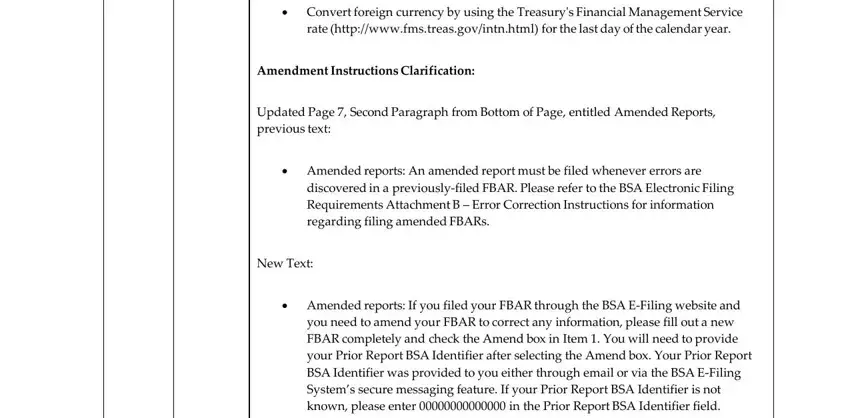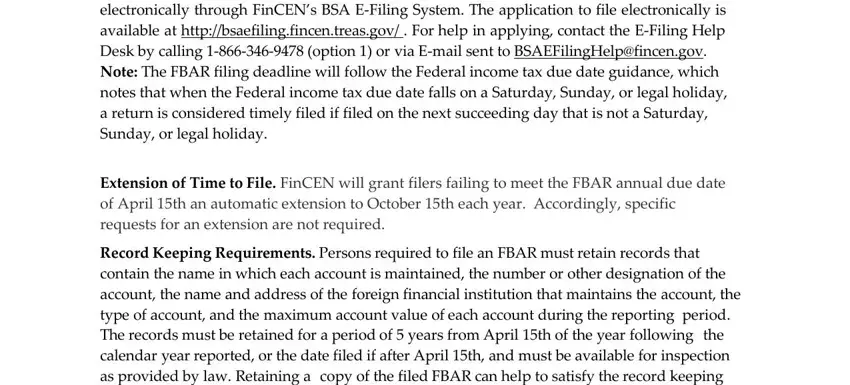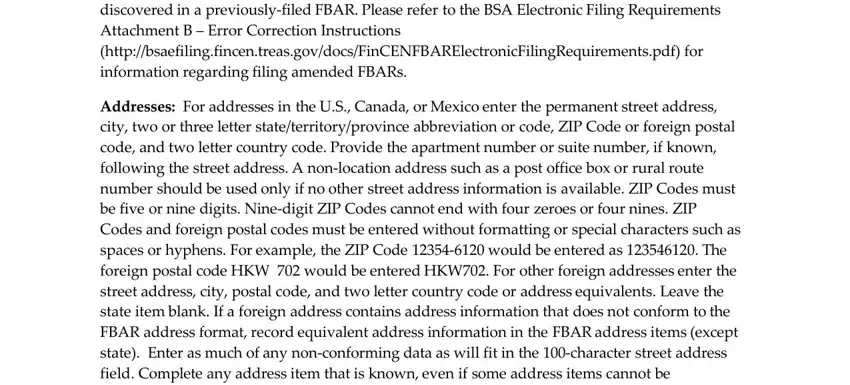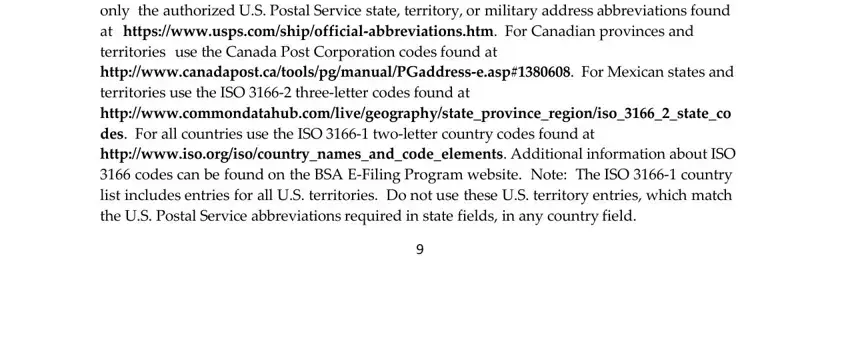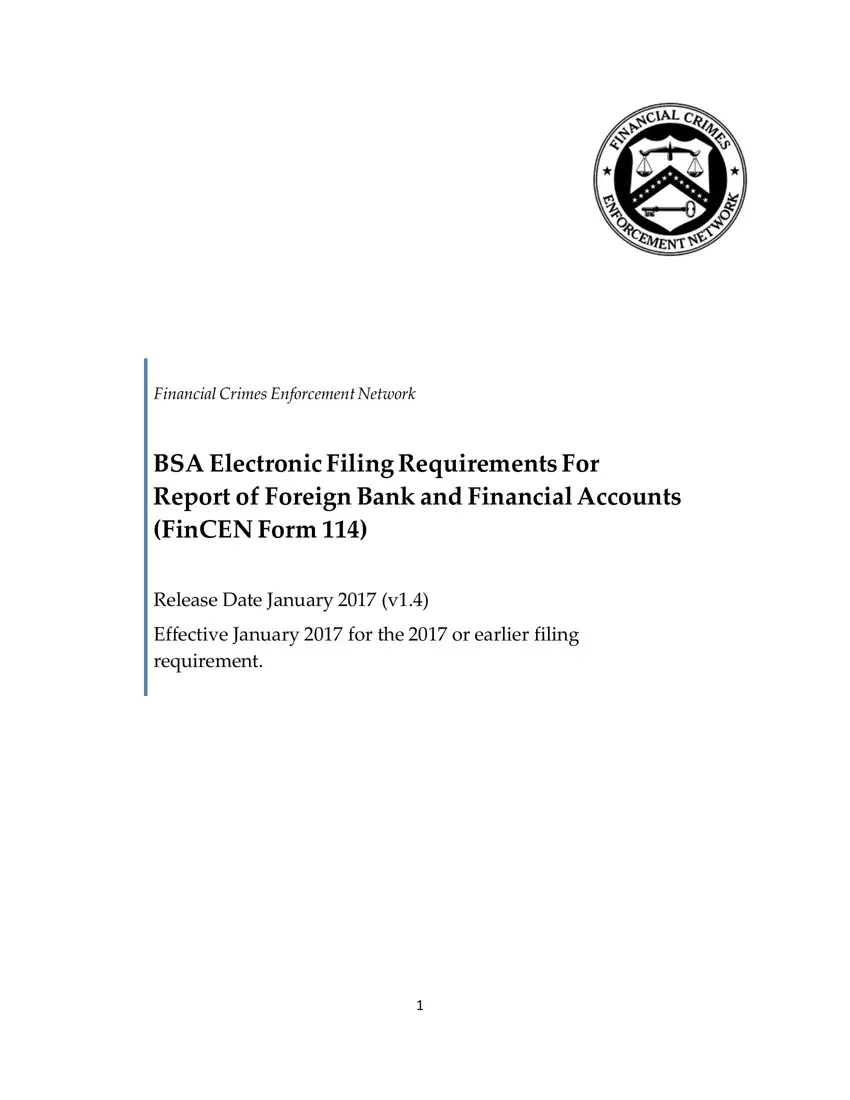Financial Crimes Enforcement Network
BSA Electronic Filing Requirements For
Report of Foreign Bank and Financial Accounts
(FinCEN Form 114)
Release Date January 2017 (v1.4)
Effective January 2017 for the 2017 or earlier filing requirement.
1
Revision History
Version |
Date |
Reason for Change |
Number |
|
|
|
|
|
1.0 |
09/30/2013 |
Initial Version |
|
|
|
1.1 |
3/14/2014 |
Conversion Rate – Incorrect Link: |
|
|
Updated Page 9, Second Paragraph starting with Step 2, Second Sentence, previous text: |
|
|
Convert foreign currency by using the Treasury's Financial Management Service |
|
|
rate (select Exchange Rates under Reference & Guidance at www.fms.treas.gov) |
|
|
for the last day of the calendar year. |
|
|
New text: |
|
|
Convert foreign currency by using the Treasury's Financial Management Service |
|
|
rate (http://www.fms.treas.gov/intn.html) for the last day of the calendar year. |
|
|
Amendment Instructions Clarification: |
|
|
Updated Page 7, Second Paragraph from Bottom of Page, entitled Amended Reports, |
|
|
previous text: |
|
|
Amended reports: An amended report must be filed whenever errors are |
|
|
discovered in a previously-filed FBAR. Please refer to the BSA Electronic Filing |
|
|
Requirements Attachment B – Error Correction Instructions for information |
|
|
regarding filing amended FBARs. |
|
|
New Text: |
|
|
Amended reports: If you filed your FBAR through the BSA E-Filing website and |
|
|
you need to amend your FBAR to correct any information, please fill out a new |
|
|
FBAR completely and check the Amend box in Item 1. You will need to provide |
|
|
your Prior Report BSA Identifier after selecting the Amend box. Your Prior Report |
|
|
BSA Identifier was provided to you either through email or via the BSA E-Filing |
|
|
System’s secure messaging feature. If your Prior Report BSA Identifier is not |
|
|
known, please enter 00000000000000 in the Prior Report BSA Identifier field. |
|
|
If your FBAR was filed using batch mode, an amended report must be filed |
|
|
whenever errors are discovered in a previously-filed FBAR. Please refer to the BSA |
|
|
Electronic Filing Requirements Attachment B – Error Correction Instructions |
|
|
(http://bsaefiling.fincen.treas.gov/docs/FinCENFBARElectronicFilingRequirements |
|
|
.pdf) for information regarding filing amended FBARs. |
|
|
|
2
1.2 |
3/28/2014 |
Telephone Numbers – Additional Instruction – Page 9 |
|
|
Added the following sentence to the end of the description: |
|
|
Telephone numbers that are part of the North American Numbering Plan should not |
|
|
be preceded with a “1”. |
|
|
Monetary Amounts – Additional Instruction – Page 10 |
|
|
Added the following sentence to the end of the description: |
|
|
Note: After determining the value of the account, as described below, if the value results in a |
|
|
negative (minus) value, enter zero (0) in Item 15, Maximum Account Value. |
|
|
|
1.3 |
6/11/2014 |
Filing requirement for minors clarified on Page 6. |
|
|
Added the following additional text: |
|
|
Responsibility for Child’s FBAR |
|
|
Generally, a child is responsible for filing his or her own FBAR report. If a child cannot file his |
|
|
or her own FBAR for any reason, such as age, the child's parent, guardian, or other legally |
|
|
responsible person must file it for the child. |
|
|
Signing the child's FBAR. If the child cannot sign his or her FBAR, a parent or guardian must |
|
|
electronically sign the child's FBAR. In item 45 Filer Title enter “Parent/Guardian filing for |
|
|
child.” |
|
|
|
1.4 |
1/1/2017 |
As mandated by the Surface Transportation and Veterans Health Care Choice Improvement |
|
|
Act of 2015, Public Law 114-41 (the Act), the annual due date for filing FBARs is April |
|
|
15th. The Act also mandated a maximum six-month extension of the filing deadline. |
|
|
FinCEN will grant filers failing to meet the FBAR annual due date of April 15th an automatic |
|
|
extension to October 15th each year. |
|
|
|
3
FBAR - Electronic Filing Instructions
The following instructions apply only to the electronic filing of the Report of Foreign Bank and Financial Accounts (FBAR), FinCEN Form 114, through the Financial Crimes Enforcement Network’s (FinCEN’s) BSA E-Filing System. Unless specifically mentioned in the text, these instructions do not apply to any other current or prior Bank Secrecy Act (BSA) reports. Also, the instructions or requirements for any prior or current BSA reports, including paper versions of the FBAR, do not apply to FBARs filed electronically under these filing requirements and instructions.
General Instructions
Purpose. FinCEN Form 114, Report of Foreign Bank and Financial Accounts, is used to report a financial interest in or signature authority over a foreign financial account. The FBAR must be received by the Department of the Treasury on or before April 15th of the year immediately following the calendar year being reported. FinCEN will grant filers failing to meet the FBAR annual due date of April 15th an automatic extension to October 15th each year. Accordingly, specific requests for this extension are not required.
Who Must File an FBAR. A United States person that has a financial interest in or signature authority over foreign financial accounts must file an FBAR if the aggregate value of the foreign financial accounts exceeds $10,000 at any time during the calendar year. See General Definitions, to determine who is a United States person.
General Definitions:
Financial Account. A financial account includes, but is not limited to, a securities, brokerage, savings, demand, checking, deposit, time deposit, or other account maintained with a financial institution (or other person performing the services of a financial institution). A financial account also includes a commodity futures or options account, an insurance policy with a cash value (such as a whole life insurance policy), an annuity policy with a cash value, and shares in a mutual fund or similar pooled fund (i.e., a fund that is available to the general public with a regular net asset value determination and regular redemptions).
Joint Account. A financial account type listed above owned jointly by two or more persons.
Foreign Financial Account. A foreign financial account is a financial account located outside of the United States. For example, an account maintained with a branch of a United States bank that is physically located outside of the United States is a foreign financial account. An account maintained with a branch of a foreign bank that is physically located in the United States is not a foreign financial account.
4
Financial Interest. A United States person has a financial interest in a foreign financial account for which:
1.the United States person is the owner of record or holder of legal title, regardless of whether the account is maintained for the benefit of the United States person or for the benefit of another person; or
2.the owner of record or holder of legal title is one of the following:
a.An agent, nominee, attorney, or a person acting in some other capacity on behalf of the United States person with respect to the account;
b.A corporation in which the United States person owns directly or indirectly: (i) more than 50 percent of the total value of shares of stock or (ii) more than 50 percent of the voting power of all shares of stock;
c.A partnership in which the United States person owns directly or indirectly: (i) an interest in more than 50 percent of the partnership's profits (e.g., distributive share of partnership income taking into account any special allocation agreement) or (ii) an interest in more than 50 percent of the partnership capital;
d.A trust of which the United States person: (i) is the trust grantor and (ii) has an ownership interest in the trust for United States federal tax purposes. See 26
U.S.C. sections 671-679 to determine if a grantor has an ownership interest in a trust;
e.A trust in which the United States person has a greater than 50 percent present beneficial interest in the assets or income of the trust for the calendar year; or
f.Any other entity in which the United States person owns directly or indirectly more than 50 percent of the voting power, total value of equity interest or assets, or interest in profits.
Person. A person means an individual (including a minor child) and legal entities including, but not limited to, a limited liability company, corporation, partnership, trust, and estate.
Signature Authority. Signature authority is the authority of an individual (alone or in conjunction with another individual) to control the disposition of assets held in a foreign financial account by direct communication (whether in writing or otherwise) to the bank or other financial institution that maintains the financial account. See Exceptions, Signature Authority.
United States. For FBAR purposes, the United States includes the States, the District of Columbia, all United States territories and possessions (e.g., American Samoa, the Commonwealth of the Northern Mariana Islands, the Commonwealth of Puerto Rico, Guam, and the United States Virgin Islands), and the Indian lands as defined in the Indian Gaming Regulatory Act. References to the laws of the United States include the laws of the United States federal government and the laws of all places listed in this definition.
United States Person. United States person means United States citizens (including minor children); United States residents; entities, including but not limited to, corporations, partnerships, or limited liability
5
companies created or organized in the United States or under the laws of the United States; and trusts or estates formed under the laws of the United States.
Note. The federal tax treatment of an entity does not determine whether the entity has an FBAR filing requirement. For example, an entity that is disregarded for purposes of Title 26 of the United States Code must file an FBAR, if otherwise required to do so. Similarly, a trust for which the trust income, deductions, or credits are taken into account by another person for purposes of Title 26 of the United States Code must file an FBAR, if otherwise required to do so.
Responsibility for Child’s FBAR
Generally, a child is responsible for filing his or her own FBAR report. If a child cannot file his or her own FBAR for any reason, such as age, the child's parent, guardian, or other legally responsible person must file it for the child.
Signing the child's FBAR. If the child cannot sign his or her FBAR, a parent or guardian must electronically sign the child's FBAR. In item 45 Filer Title enter “Parent/Guardian filing for child.”
United States Resident. A United States resident is an alien residing in the United States. To determine if the filer is a resident of the United States apply the residency tests in 26 U.S.C. section 7701(b). When applying the residency tests, use the definition of United States in these instructions.
Exceptions:
Certain Accounts Jointly Owned by Spouses. The spouse of an individual who files an FBAR is not required to file a separate FBAR if the following conditions are met: (1) all the financial accounts that the non-filing spouse is required to report are jointly owned with the filing spouse; 2) the filing spouse reports the jointly owned accounts on a timely filed FBAR electronically signed; and (3) the filers have completed and signed Form 114a, “Record of Authorization to Electronically File FBAR’s” (maintained with the filers’ records). Otherwise, both spouses are required to file separate FBARs, and each spouse must report the entire value of the jointly owned accounts. See instructions for specific items, Part III, Items 25-33.
Consolidated FBAR. If a United States person that is an entity is named in a consolidated FBAR filed by a greater than 50 percent owner, such entity is not required to file a separate FBAR. See Explanations for Specific Items, Part V.
Correspondent/Nostro Account. Correspondent or nostro accounts (which are maintained by banks and used solely for bank-to-bank settlements) are not required to be reported.
Governmental Entity. A foreign financial account of any governmental entity of the United States (as defined above) is not required to be reported by any person. For purposes of this form, governmental entity includes a college or university that is an agency of, an
6
instrumentality of, owned by, or operated by a governmental entity. For purposes of this form, governmental entity also includes an employee retirement or welfare benefit plan of a governmental entity.
International Financial Institution. A foreign financial account of any international financial institution (if the United States government is a member) is not required to be reported by any person.
IRA Owners and Beneficiaries. An owner or beneficiary of an IRA is not required to report a foreign financial account held in the IRA.
Participants in and Beneficiaries of Tax-Qualified Retirement Plans. A participant in or beneficiary of a retirement plan described in Internal Revenue Code section 401(a), 403(a), or 403(b) is not required to report a foreign financial account held by or on behalf of the retirement plan.
Signature Authority. Individuals who have signature authority over, but no financial interest in, a foreign financial account are not required to report the account in the following situations:
1.An officer or employee of a bank that is examined by the Office of the Comptroller of the Currency, the Board of Governors of the Federal Reserve System, the Federal Deposit Insurance Corporation, the Office of Thrift Supervision, or the National Credit Union Administration is not required to report signature authority over a foreign financial account owned or maintained by the bank.
2.An officer or employee of a financial institution that is registered with and examined by the Securities and Exchange Commission or Commodity Futures Trading Commission is not required to report signature authority over a foreign financial account owned or maintained by the financial institution.
3.An officer or employee of an Authorized Service Provider is not required to report signature authority over a foreign financial account that is owned or maintained by an investment company that is registered with the Securities and Exchange Commission. Authorized Service Provider means an entity that is registered with and examined by the Securities and Exchange Commission and provides services to an investment company registered under the Investment Company Act of 1940.
4.An officer or employee of an entity that has a class of equity securities listed (or American depository receipts listed) on any United States national securities exchange is not required to report signature authority over a foreign financial account of such entity.
5.An officer or employee of a United States subsidiary is not required to report signature authority over a foreign financial account of the subsidiary if its United States parent has a class of equity securities listed on any United States national securities exchange and the subsidiary is included in a consolidated FBAR report of the United States parent.
6.An officer or employee of an entity that has a class of equity securities registered (or American depository receipts in respect of equity securities registered) under section 12(g) of the Securities Exchange Act is not required to report signature authority over a foreign financial account of such entity.
7
Trust Beneficiaries. A trust beneficiary with a financial interest described in section (2)(e) of the financial interest definition is not required to report the trust's foreign financial accounts on an FBAR if the trust, trustee of the trust, or agent of the trust: (1) is a United States person and (2) files an FBAR disclosing the trust's foreign financial accounts.
United States Military Banking Facility. A financial account maintained with a financial institution located on a United States military installation is not required to be reported, even if that military installation is outside of the United States.
Filing Information:
When and Where to File. The FBAR is an annual report and must be filed on or before April 15th of the year following the calendar year being reported. The FBAR must be filed electronically through FinCEN’s BSA E-Filing System. The application to file electronically is available at http://bsaefiling.fincen.treas.gov/ . For help in applying, contact the E-Filing Help Desk by calling 1-866-346-9478 (option 1) or via E-mail sent to BSAEFilingHelp@fincen.gov. Note: The FBAR filing deadline will follow the Federal income tax due date guidance, which notes that when the Federal income tax due date falls on a Saturday, Sunday, or legal holiday, a return is considered timely filed if filed on the next succeeding day that is not a Saturday, Sunday, or legal holiday.
Extension of Time to File. FinCEN will grant filers failing to meet the FBAR annual due date of April 15th an automatic extension to October 15th each year. Accordingly, specific requests for an extension are not required.
Record Keeping Requirements. Persons required to file an FBAR must retain records that contain the name in which each account is maintained, the number or other designation of the account, the name and address of the foreign financial institution that maintains the account, the type of account, and the maximum account value of each account during the reporting period. The records must be retained for a period of 5 years from April 15th of the year following the calendar year reported, or the date filed if after April 15th, and must be available for inspection as provided by law. Retaining a copy of the filed FBAR can help to satisfy the record keeping requirements.
An officer or employee who files an FBAR to report signature authority over an employer's foreign financial account is not required to personally retain records regarding these accounts.
Recording information: Complete each FBAR by providing as much information as possible. Although all items should be completed fully and accurately, items marked with an asterisk (*) in the instructions must be completed.
NOTE: Throughout these instructions the phrase “check box” and similar wording is used to denote checking an appropriate box in certain data items on the electronic discrete FBAR. This is deemed equivalent to instructions in the Electronic Filing Requirements to enter appropriate codes in the same data items in transmission files. For example, the requirement to check a box in Item 2 “Type of Filer” in the discrete FBAR is the equivalent of entering one of the
8
codes A through E in “Type of Filer” in the Electronic Filing Requirements Filer Information (2A) Record.
Amended reports: If you filed your FBAR through the BSA E-Filing website and you need to amend your FBAR to correct any information, please fill out a new FBAR completely and check the Amend box in Item 1. You will need to provide your Prior Report BSA Identifier after selecting the Amend box. Your Prior Report BSA Identifier was provided to you either through email or via the BSA E-Filing System’s secure messaging feature. If your Prior Report BSA Identifier is not known, please enter 00000000000000 in the Prior Report BSA Identifier field.
If your FBAR was filed using batch mode, an amended report must be filed whenever errors are discovered in a previously-filed FBAR. Please refer to the BSA Electronic Filing Requirements Attachment B – Error Correction Instructions (http://bsaefiling.fincen.treas.gov/docs/FinCENFBARElectronicFilingRequirements.pdf) for information regarding filing amended FBARs.
Addresses: For addresses in the U.S., Canada, or Mexico enter the permanent street address, city, two or three letter state/territory/province abbreviation or code, ZIP Code or foreign postal code, and two letter country code. Provide the apartment number or suite number, if known, following the street address. A non-location address such as a post office box or rural route number should be used only if no other street address information is available. ZIP Codes must be five or nine digits. Nine-digit ZIP Codes cannot end with four zeroes or four nines. ZIP Codes and foreign postal codes must be entered without formatting or special characters such as spaces or hyphens. For example, the ZIP Code 12354-6120 would be entered as 123546120. The foreign postal code HKW 702 would be entered HKW702. For other foreign addresses enter the street address, city, postal code, and two letter country code or address equivalents. Leave the state item blank. If a foreign address contains address information that does not conform to the FBAR address format, record equivalent address information in the FBAR address items (except state). Enter as much of any non-conforming data as will fit in the 100-character street address field. Complete any address item that is known, even if some address items cannot be completed because of incompatible formats (e.g. state codes). No abbreviations are permitted in city names, which must be completely spelled out. A U.S. city name should match the city name used by the U.S. Postal Service for the associated state and ZIP Code. For U.S. address use only the authorized U.S. Postal Service state, territory, or military address abbreviations found at https://www.usps.com/ship/official-abbreviations.htm. For Canadian provinces and territories use the Canada Post Corporation codes found at http://www.canadapost.ca/tools/pg/manual/PGaddress-e.asp#1380608. For Mexican states and territories use the ISO 3166-2 three-letter codes found at
http://www.commondatahub.com/live/geography/state_province_region/iso_3166_2_state_co
des. For all countries use the ISO 3166-1 two-letter country codes found at http://www.iso.org/iso/country_names_and_code_elements. Additional information about ISO 3166 codes can be found on the BSA E-Filing Program website. Note: The ISO 3166-1 country list includes entries for all U.S. territories. Do not use these U.S. territory entries, which match the U.S. Postal Service abbreviations required in state fields, in any country field.
9
Telephone numbers: Record all telephone numbers as a single number string without formatting or special characters such as parentheses, spaces, or hyphens. For example, a number in the format (NNN) NNN-NNNN would be recorded as NNNNNNNNNN. Telephone numbers that are part of the North American Numbering Plan used by the U.S., Canada, many Caribbean countries, and present/former U.S. Pacific island protectorates must consist of an area code and seven-digit telephone number. Telephone numbers that are part of the North American Numbering Plan should not be preceded with a “1.”
Identifying numbers: Enter all identifying numbers as a single text string without formatting or special characters such as hyphens or periods. An identifying number in the format NNN- NN- NNNN would be entered as NNNNNNNNN. Such numbers may include letter and number characters. Common identifying numbers include account numbers, alien registration numbers, Employer Identification Numbers (EIN), passport numbers, Social Security Numbers (SSN), and foreign TIN’s.
Monetary amounts: When recording the maximum value of accounts, record all amounts as U.S. Dollar amounts rounded up to the next whole dollar. The amount $15,265.25 would be recorded as $15,266. The maximum value of the account can be determined using the following steps.
NOTE: After determining the value of the account, as described below, if the value results in a negative (minus) value, enter zero (0) in item 15, “Maximum account value.”
Step 1. Determine the maximum value of each account (in the currency of that account) during the calendar year being reported. The maximum value of an account is a reasonable approximation of the greatest value of currency or nonmonetary assets in the account during the calendar year. Periodic account statements may be relied on to determine the maximum value of the account, provided that the statements fairly reflect the maximum account value during the calendar year. For Item 15, if the filer had a financial interest in more than one account, each account must be valued separately. For an account denominated in U.S. Dollars, the maximum value of the account is the largest U.S. Dollar value of the account during the report year.
Step 2. In the case of non-United States currency, convert the maximum account value for each account into United States dollars. Convert foreign currency by using the Treasury's Financial Management Service rate (select Exchange Rates under Reference & Guidance at www.fms.treas.gov) for the last day of the calendar year. If no Treasury Financial Management Service rate is available, use another verifiable exchange rate and provide the source of that rate. In valuing currency of a country that uses multiple exchange rates, use the rate that would apply if the currency in the account were converted into United States dollars on the last day of the calendar year.
If the maximum account value of a single account or aggregate of the maximum account
values of multiple accounts exceeds $10,000, an FBAR must be filed. An FBAR is not required 10
